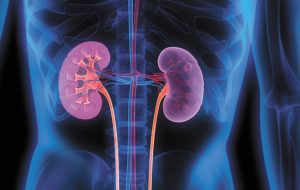 Kidney disease and diabetes are interrelated comorbidities. With Type II diabetes, 10 to 40 percent of patients may develop kidney failure and 10-30 percent of those with Type I diabetes might also develop the disorder, and the disease may progress.
Kidney disease and diabetes are interrelated comorbidities. With Type II diabetes, 10 to 40 percent of patients may develop kidney failure and 10-30 percent of those with Type I diabetes might also develop the disorder, and the disease may progress.
How Diabetes Affects the Kidneys
High blood sugar damages the blood vessels throughout the body. When blood vessels in the kidneys are damaged, the kidneys cannot properly clean the blood of toxins. Kidney damage and kidney failure cause water retention and sodium storage. This may cause infection. With the accumulation of toxins and waste, the body will suffer adversely, and the disease will progress.
Urinary Bladder Health
Diabetes cause issues with urination due to damaged nerves in the bladder. If you cannot urinate and void completely, the urine can become backed up into the kidneys and results in infection. The rapid growth of bacteria in the urine often has a high sugar level and causes urinary tract infections.
Signs of Kidney Disease in Patients with Diabetes
• Albumin/protein in the urine
• High blood pressure
• Ankle and leg swelling
• Leg cramps
• Going to the bathroom more often at night
• High levels of BUN and creatinine in blood
• Reduced need for insulin or antidiabetic medications (diseased kidneys cause less breakdown of insulin)
• Morning sickness, nausea and vomiting
• Weakness, paleness and anemia
• Itching
The causes of diabetic kidney disease are complex and most likely related to many factors. Some experts feel that changes in the circulation of blood within the filtering units of the kidney (glomeruli) may play an important role.
Treatment is Critical
In the early stages, there may not be any symptoms. As kidney function decreases further, toxic wastes build up, and patients often feel sick to their stomachs and throw up, lose their appetites, have hiccups, and gain weight due to fluid retention. If left untreated, patients can also develop heart failure and fluid in their lungs.
What you can do
Controlling blood sugar levels, blood pressure and urinary bladder issues is best to limit the progression of the disease. Avoid over-the-counter pain medications and other medications that damage the kidneys.
Medical Treatment Standards
Once the kidneys fail, three types of treatment can be used. These include kidney transplantation, hemodialysis, and peritoneal dialysis.
An Alternative Treatment Option
Some studies suggest that a group of high blood pressure medicines called ACE inhibitors may help to prevent or delay the progression of diabetic kidney disease. These drugs reduce blood pressure in your body, and they may lower the pressure within the kidney’s filtering apparatus (the glomerulus). They also seem to have beneficial effects that are unrelated to changes in blood pressure. Patients who take these medicines may have less protein in their urine. SGLT2 inhibitors are a newer class of medicines, some of which can also help reduce the risk of heart or kidney disease in people with diabetic kidney disease. SGLT2 inhibitors can also reduce hospitalization risk from heart failure. Other medicines, such as GLP-1 agonists and MRAs, are also being studied for risk reduction of heart and kidney disease in people with diabetic kidney disease. You may want to speak to your doctor or another member of your healthcare team, to see if these medicines could help you.
Sunshine Kidney Care
Nephrology Associates
352.388.5800
Ste 522 The Sharon Morse Medical Office Building
1400 US Hwy 441N, The Villages FL 32159
Source:
https://www.kidney.org/atoz/content/diabetes
https://www.kidney.org/atoz/content/preventkiddisease
 Central Florida Health and Wellness Magazine Health and Wellness Articles of the Villages
Central Florida Health and Wellness Magazine Health and Wellness Articles of the Villages



